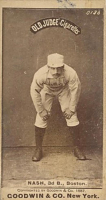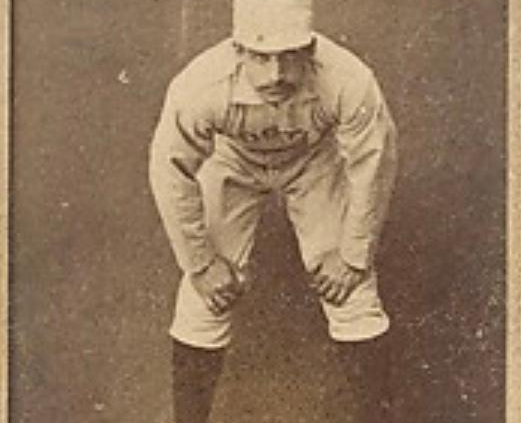May 19, 1893: The home run that wasn’t
 Discerning Beaneaters fans had a choice on Friday, May 19, 1893. Should they skip that afternoon’s game with the Brooklyn Bridegrooms because of the threatening weather or risk getting wet to see their heroes take on Ed Stein, the young season’s hottest pitcher? A 27-game winner the prior year, Stein, after dropping his first start, had won five straight including a victory over Boston just a week earlier. But the Brooklyn pitcher wasn’t just winning games; he was dominating opponents, allowing Boston just three hits and throwing a one-hitter against Philadelphia.1
Discerning Beaneaters fans had a choice on Friday, May 19, 1893. Should they skip that afternoon’s game with the Brooklyn Bridegrooms because of the threatening weather or risk getting wet to see their heroes take on Ed Stein, the young season’s hottest pitcher? A 27-game winner the prior year, Stein, after dropping his first start, had won five straight including a victory over Boston just a week earlier. But the Brooklyn pitcher wasn’t just winning games; he was dominating opponents, allowing Boston just three hits and throwing a one-hitter against Philadelphia.1
Stein’s mound opponent was Jack Stivetts, a 35-game winner the year before, but just 3-3 thus far in 1893, including being “batted all over the field” in one start and suffering a “cannonading” in another.2 Although some of Stivetts’s problems may have been caused by the lengthening of the pitching distance to 60 feet 6 inches, sportswriter O.P. Caylor believed excessive drinking was the reason the Boston pitcher had “not been so effective this season.”3 Although Boston fans had both the weather and a matchup between two pitchers seemingly going in opposite directions as excuses to stay away, an estimated 2,500 turned up for what the Boston Journal called a game “which for real pleasure and excitement may not be equaled this season.”4
Fortunately, the rain held off and the game developed into a pitchers’ duel with both hurlers in command, not necessarily of their pitches, but definitely of the opposing batters. Stivetts was wild, to put it mildly, walking eight over the first eight innings, but the Boston pitcher didn’t allow a single hit or permit a runner to advance beyond second base. Beaneaters batters were equally ineffective against Stein, registering only one hit through eight innings, and the game headed to the ninth scoreless and almost hitless.5 But any fan disappointed by the lack of scoring would soon get more than his share of offensive fireworks.
Tom Daly began the Brooklyn ninth by reaching first on a “pretty bunt.”6 Next up was Danny Richardson, who “hit an easy bounder” to Stivetts, but the Bridegrooms got lucky when the Boston pitcher “grabbed at [the ball] like a blind man, and after fumbling awhile, threw it over first base.7 Instead of what Tim Murnane, writing in the Boston Globe, thought should have been a double play, Brooklyn had men on second and third and none out.
Doubtless cursing himself while bearing down at the same time, Stivetts got Tommy Corcoran to ground to third baseman Billy Nash, who threw Daly out at home. The Boston pitcher wasn’t, however, so fortunate with Con Daily, who doubled, driving in Richardson and again putting runners at second and third with just one out.
Next up was Stein, who grounded out to Tommy Tucker at first base, but when Tucker tried to throw out Richardson at home, the baserunner collided with Boston catcher Charlie Ganzel, allowing not just Richardson but also Daily to score. Stivetts got the final out without further incident, but the damage was done and the Beaneaters trailed 3-0 as they came to bat for what was likely the last time.8
Considering the Beaneaters had done nothing with Stein for eight innings, it was no surprise that “the home patrons began to file out of the grounds.”9 But even if the fans had given up, that wasn’t the case with the Boston team, which Murnane said “always plays the string out.” After Tommy McCarthy walked, Nash “sent the ball over the left field fence” and the Bostons were within one run.10 Or were they?
Although he was obviously entitled to score, Nash wasn’t required to do so and according to the Journal, he elected to remain at third to “possibly make Stein unsteady.”11 It seems a strange strategy, but although the Brooklyn Daily Eagle claimed Nash’s hit didn’t leave the park and he was held at third, the Boston papers were clear that Nash chose to remain there rather than score.
Whether his presence rattled Stein is debatable, but no one could argue with the result when Tucker “cracked one against the right field fence,” driving in Nash and putting himself in scoring position.12 A few minutes later Tucker scored on Tom Daly’s throwing error, tying the game and leading fans to “cut as many other ‘monkey-shines’ as the most partisan college student.”13 Although the Beaneaters threatened to win the game right then and there, they failed to score and the game headed to the 10th.14
Stivetts’s lack of control continued to plague him, helping the Bridegrooms load the bases, although Murnane attributed “much of the blame” to the calls of umpire John Gaffney.15 Although Boston was fortunate to limit the damage, Brooklyn scored once, putting the Beaneaters’ backs against the wall again.
Fortunately for Boston and its fans, Nash was up third in the inning. Although two were out and none on, the Boston third baseman didn’t disappoint, again homering over the left-field wall. This time he didn’t stop at third, tying the score and earning an ovation that “has seldom been equaled on the [Boston] grounds.”16
Tied at 4-4, the game remained that way through a scoreless 11th and headed to the 12th with both starters still on the mound. If he didn’t have enough problems with his lack of control, Stivetts was betrayed by the Boston defense when Cliff Carroll muffed Oyster Burns’ fly ball, supposedly because, as Murnane cruelly put it, he was afraid “to dampen his feet in the wet grass.”17 After a sacrifice, Tom Daly singled in Burns and Brooklyn once again took the lead.
At this point, it was unlikely anyone expected Boston to go quietly and they weren’t disappointed. Stein did nothing to help himself when he threw away Carroll’s grounder, but somehow the Beaneaters batter made his second mistake of the inning and “lost a chance to make second base.”
Next up was future Hall of Famer Hugh Duffy, who managed only “a measly little grounder,” forcing Carroll at second. After McCarthy went out, Boston’s last chance was fittingly in the hands or bat of Nash, who “came up smiling” to “a ringing old shout” from the crowd. That roar was probably nothing compared to the sound when Nash hit the third pitch over the left-field fence, but sadly for him and Boston, it was foul by five feet.
With masterful understatement, Murnane said, “Stein looked worried.” Tempting the baseball gods by putting the winning run on base, Stein walked Nash, but got away with it when Tucker made the final out.18
After 12 innings of baseball drama, the New York Sun understandably believed “everybody, players included, felt weak,” but the paper thought Boston had “no reason to feel down in the mouth.”19 Back in Brooklyn, the Eagle bragged that the win, the second straight over the defending champions on their home ground, was “indeed a triumph.”20
But if the paper, the Brooklyn club, or its fans thought this was a sign of a successful season, they were wrong because the Bridegrooms would finish in a sixth-place tie with Cincinnati, while Boston would win the pennant. A few days later, Stein won his seventh straight game, but it was downhill from there as he went 12-14 the rest of the season.
Stivetts would continue to experience mixed success in 1893, winning 20 games, a far cry from his 35 victories the year before. Nash hit eight more home runs in 1893, but it is doubtful that he enjoyed any as much as the two on that May afternoon even though they came in a losing effort.
Notes
1 “A Hot Game, Forsooth!” Brooklyn Daily Eagle, May 20, 1893: 3.
2 Philadelphia Inquirer, May 7, 1893: 3; Daily Evening Bulletin (Haverhill, Massachusetts), May 11, 1893: 1.
3 Evening Herald (Shenandoah, Pennsylvania), October 7, 1893: 3; Peter Morris, A Game of Inches: The Story Behind the Innovations That Shaped Baseball (Chicago: Ivan R. Dee, 2010), 27.
4 “Twelve Innings,” Boston Journal, May 20, 1893: 3; Baltimore Sun, May 20, 1893: 6.
5 “Twelve Innings.”
6 T.H. Murnane, “Bungling Work,” Boston Globe, May 20, 1893: 6.
7 Ibid.
8 Ibid., “Twelve Innings”; “A Hot Game, Forsooth!”
9 “Twelve Innings.”
10 Murnane.
11 Ibid.; “Twelve Innings.”
12 “Bungling Work.”
13 ”Twelve Innings.”
14 “A Hot Game, Forsooth!”; “Twelve Innings”; Murnane.
15 Murnane.
16 “Twelve Innings.”
17 Murnane.
18 Ibid.
19 New York Sun, May 20, 1893: 4.
20 “A Hot Game, Forsooth!”
Additional Stats
Brooklyn Bridegrooms 5
Boston Beaneaters 4
12 innings
South End Grounds
Boston, MA
Corrections? Additions?
If you can help us improve this game story, contact us.


